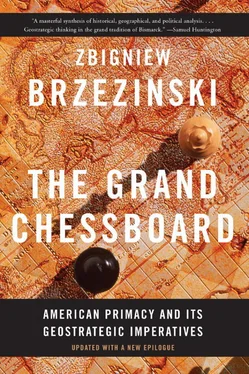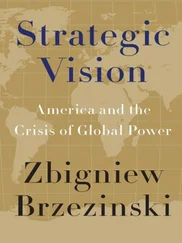In practical terms, the foregoing will require gradual accommodation to a shared leadership in NATO, greater acceptance of France’s concerns for a European role not only in Africa but also in the Middle East, and continued support for the eastward expansion of the EU, even as the EU becomes a more politically and economically assertive global player. [1]A Transatlantic Free Trade Agreement, already advocated by a number of prominent Atlantic leaders, could also mitigate the risk of growing economic rivalry between a more united EU and the United States. In any case, the EU’s eventual success in burying the centuries-old European nationalist antagonisms, with their globally disruptive effects, would be well worth some gradual diminution in America’s decisive role as Eurasia’s current arbitrator.
The enlargement of NATO and the EU would serve to reinvigorate Europe’s own waning sense of a larger vocation, while consolidating, to the benefit of both America and Europe, the democratic gains won through the successful termination of the Cold War. At stake in this effort is nothing less than America’s long-range relationship with Europe itself. A new Europe is still taking shape, and if that new Europe is to remain geopolitically a part of the “Euro-Atlantic” space, the expansion of NATO is essential. By the same token, a failure to widen NATO, now that the commitment has been made, would shatter the concept of an expanding Europe and demoralize the Central Europeans. It could even reignite currently dormant or dying Russian geopolitical aspirations in Central Europe.
Indeed, the failure of the American-led effort to expand NATO could reawaken even more ambitious Russian desires. It is not yet evident—and the historical record is strongly to the contrary—that the Russian political elite shares Europe’s desire for a strong and enduring American political and military presence. Therefore, while the fostering of an increasingly cooperative relationship with Russia is clearly desirable, it is important for America to send a clear message about its global priorities. If a choice has to be made between a larger Euro-Atlantic system and a better relationship with Russia, the former has to rank incomparably higher to America.
For that reason, any accommodation with Russia on the issue of NATO enlargement should not entail an outcome that has the effect of making Russia a de facto decision-making member of the alliance, thereby diluting NATO’s special Euro-Atlantic character while simultaneously relegating its newly admitted members to second-class status. That would create opportunities for Russia to resume not only the effort to regain a sphere of influence in Central Europe but to use its presence within NATO to play on any American-European disagreements in order to reduce the American role in European affairs.
It is also crucial that, as Central Europe enters NATO, any new security assurances to Russia regarding the region be truly reciprocal and thus mutually reassuring. Restrictions on the deployment of NATO troops and nuclear weapons on the soil of new members can be an important factor in allaying legitimate Russian concerns, but these should be matched by symmetrical Russian assurances regarding the demilitarization of the potentially strategically menacing salient of Kaliningrad and by limits on major troop deployments near the borders of the prospective new members of NATO and the EU. While all of Russia’s newly independent western neighbors are anxious to have a stable and cooperative relationship with Russia, the fact is that they continue to fear it for historically understandable reasons. Hence, the emergence of an equitable NATO/EU accommodation with Russia would be welcomed by all Europeans as a signal that Russia is finally making the much-desired postimperial choice in favor of Europe.
That choice could pave the way for a wider effort to enhance Russia’s status and esteem. Formal membership in the G-7, as well as the upgrading of the policy-making machinery of the OSCE (within which a special security committee composed of America, Russia, and several key European countries could be established), would create opportunities for constructive Russian engagement in shaping both the political and security dimensions of Europe. Coupled with ongoing Western financial assistance to Russia, along with the development of much more ambitious schemes for linking Russia more closely to Europe through new highway and railroad networks, the process of giving substance to a Russian choice in favor of Europe could move forward significantly.
Russia’s longer-term role in Eurasia will depend largely on the historic choice that Russia has to make, perhaps still in the course of this decade, regarding its own self-definition. Even with Europe and China increasing the radius of their respective regional influence, Russia will remain in charge of the world’s largest single piece of real estate. It spans ten time zones and is territorially twice as large as either the United States or China, dwarfing in that regard even an enlarged Europe. Hence, territorial deprivation is not Russia’s central problem. Rather, the huge Russia has to face squarely and draw the proper implications from the fact that both Europe and China are already economically more powerful and that China is also threatening to outpace Russia on the road to social modernization.
In these circumstances, it should become more evident to the Russian political elite that Russia’s first priority is to modernize itself rather than to engage in a futile effort to regain its former status as a global power. Given the enormous size and diversity of the country, a decentralized political system, based on the free market, would be more likely to unleash the creative potential of both the Russian people and the country’s vast natural resources. In turn, such a more decentralized Russia would be less susceptible to imperial mobilization. A loosely confederated Russia—composed of a European Russia, a Siberian Republic, and a Far Eastern Republic—would also find it easier to cultivate closer economic relations with Europe, with the new states of Central Asia, and with the Orient, which would thereby accelerate Russia’s own development. Each of the three confederated entities would also be more able to tap local creative potential, stifled for centuries by Moscow’s heavy bureaucratic hand.
A clear choice by Russia in favor of the European option over the imperial one will be more likely if America successfully pursues the second imperative strand of its strategy toward Russia: namely, reinforcing the prevailing geopolitical pluralism in the post-Soviet space. Such reinforcement will serve to discourage any imperial temptations. A postimperial and Europe-oriented Russia should actually view American efforts to that end as helpful in consolidating regional stability and in reducing the possibility of conflicts along its new, potentially unstable southern frontiers. But the policy of consolidating geopolitical pluralism should not be conditioned on the existence of a good relationship with Russia. Rather, it is also important insurance in case such a good relationship fails to develop, as it creates impediments to the reemergence of any truly threatening Russian imperial policy.
It follows that political and economic support for the key newly independent states is an integral part of a broader strategy for Eurasia. The consolidation of a sovereign Ukraine, which in the meantime redefines itself as a Central European state and engages in closer integration with Central Europe, is a critically important component of such a policy, as is the fostering of a closer relationship with such strategically pivotal states as Azerbaijan and Uzbekistan, in addition to the more generalized effort to open up Central Asia (in spite of Russian impediments) to the global economy.
Читать дальше












